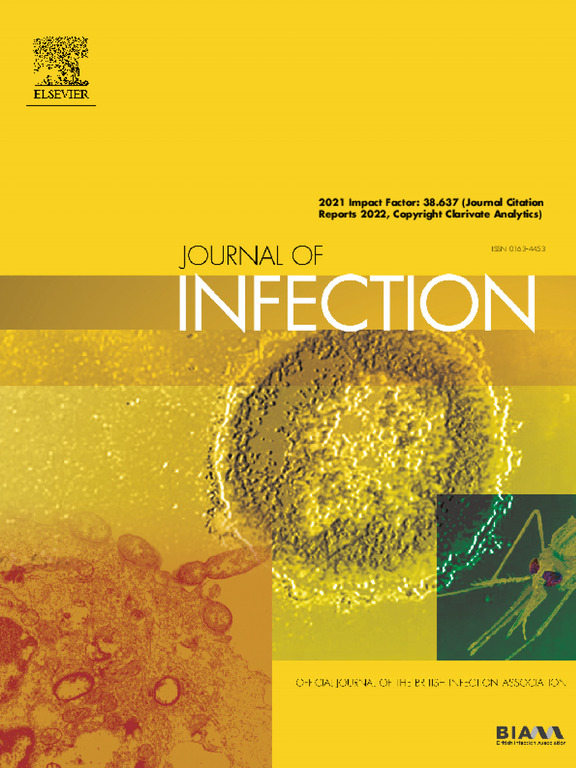Characterising the SARS-CoV-2 nucleocapsid (N) protein antibody response
IF 14.3
1区 医学
Q1 INFECTIOUS DISEASES
引用次数: 0
Abstract
Objectives
SARS-CoV-2 nucleocapsid (N) protein antibodies can be used to identify the serological response to natural infection in those who have previously received a COVID-19 spike-based vaccine. Anti-N antibody responses can also be induced by inactivated whole SARS-CoV-2 virus vaccines, such as CoronaVac. We aimed to characterise antibody responses to the N protein following COVID-19 and following vaccination with CoronaVac.
Methods
Using participants from an international randomised controlled trial, we investigated the evolution of anti-N antibody responses over time in two separate groups: adults following COVID-19, and in adults following vaccination with CoronaVac.
Results
In 212 participants who had COVID-19, the anti-N seroconversion rate was 96.9% in those infected following an incomplete course of COVID-19 (spike-based) vaccinations and 88.2% in those infected following a complete course. Anti-N antibody indices were highly variable between participants, and higher in participants who had more severe COVID-19 symptoms, were aged ≥60 years, were unvaccinated, had comorbidities and those resident in Brazil. Most participants remained seropositive after 12 months. In 317 separate participants, the anti-N seroconversion rate was 63.5% following CoronaVac vaccination, with variable antibody indices.
Conclusions
Anti-N responses to COVID-19 and CoronaVac are highly variable but persistent. A prior complete course of COVID-19 spike-based vaccination reduced both anti-N seroconversion and antibody indices following COVID-19.
表征SARS-CoV-2核衣壳蛋白抗体反应。
目的:SARS-CoV-2核衣壳蛋白抗体可用于检测先前接种过COVID-19刺突疫苗的人对自然感染的血清学反应。在接受灭活的SARS-CoV-2全病毒疫苗(如CoronaVac)的患者中也可以检测到抗n抗体反应。我们的目的是表征COVID-19和冠状病毒疫苗接种后对N蛋白的抗体反应。方法:研究人员使用一项国际随机对照试验的参与者,研究了两组患者抗n抗体反应随时间的演变:感染COVID-19后,或接种冠状病毒疫苗后。结果:在212名患有COVID-19的参与者中,在未完成COVID-19疫苗接种过程(基于峰值)的感染者中,抗n血清转化率为96.9%,在完全接种疫苗的感染者中为88.2%。抗n抗体指数在参与者之间存在很大差异,在COVID-19症状更严重、年龄≥60岁、未接种疫苗、有合并症和巴西居民的参与者中,抗n抗体指数更高。大多数参与者在12个月后仍呈血清阳性。在317名单独的参与者中,冠状病毒疫苗接种后抗n血清转换率为63.5%,抗体指标可变。结论:对COVID-19和CoronaVac的抗n反应是高度可变的,但是持久的。先前完整的基于COVID-19尖峰的疫苗接种过程降低了COVID-19后的抗n血清转化和抗体指数。
本文章由计算机程序翻译,如有差异,请以英文原文为准。
求助全文
约1分钟内获得全文
求助全文
来源期刊

Journal of Infection
医学-传染病学
CiteScore
45.90
自引率
3.20%
发文量
475
审稿时长
16 days
期刊介绍:
The Journal of Infection publishes original papers on all aspects of infection - clinical, microbiological and epidemiological. The Journal seeks to bring together knowledge from all specialties involved in infection research and clinical practice, and present the best work in the ever-changing field of infection.
Each issue brings you Editorials that describe current or controversial topics of interest, high quality Reviews to keep you in touch with the latest developments in specific fields of interest, an Epidemiology section reporting studies in the hospital and the general community, and a lively correspondence section.
 求助内容:
求助内容: 应助结果提醒方式:
应助结果提醒方式:


